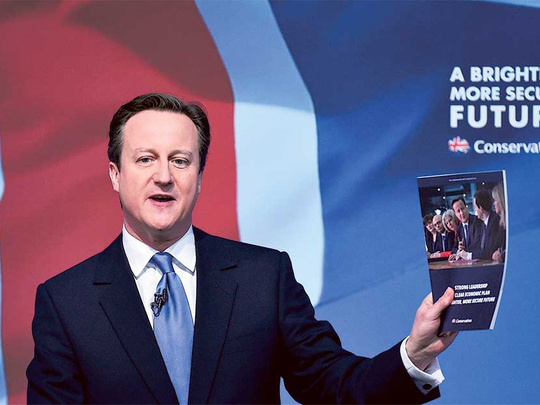
LONDON: British Conservative Prime Minister David Cameron launched his party’s manifesto on Tuesday, promising a return to the “good life” and the revival of a housing policy associated with Margaret Thatcher if he wins May’s election.
Cameron announced an extension of the “right-to-buy” housing policy of 1980s “Iron Lady” Thatcher, revealed plans for free childcare and pledged that minimum-wage workers will pay no income tax.
With opinion polls putting the centre-right Tories neck-and-neck with the opposition Labour Party, he tried to play on Labour’s weak reputation on the economy in a bid to put his side ahead in the last few weeks of campaigning.
“We’re on the brink of something special,” he told activists at a school in Swindon, southwest England. “Let’s not let Labour drag us back to square one.
“We can turn the good news in the economy into a good life for you and your family. Britain can be this buccaneering, world-beating, can-do country again”.
The Conservatives blame Labour for running up a budget deficit of some £90 billion (Dh477 billion; $130 billion) during 13 years in government before they were voted out in 2010 and replaced by a Tory-Liberal Democrat coalition.
Neither main party looks set to win outright on May 7, raising the prospect of another coalition or a minority government.
The “right-to-buy” scheme will extend home purchase discounts already enjoyed by some tenants to 1.3 million more tenants of housing associations — private non-profits that provide low-rent accommodation that often receive public subsidy.
“Conservatives have dreamed of building a property-owning democracy for generations, and today I can tell you what this generation of Conservatives is going to do,” Cameron said.
Aimed at tackling Britain’s housing crisis, a hot political issue as house prices and rents have soared amid a shortage of low-cost homes, the pledge will extend an iconic policy first introduced by Thatcher in 1980 and popular with aspirational lower income voters.
Critics claim the original “right-to-buy” policy fuelled Britain’s housing crisis by reducing the amount of affordable housing available.
But Cameron insisted this would not be the case this time as his plan would require each property sold to be replaced on a one-for-one basis.
At the manifesto launch, the prime minister added that he would work for “the people who live within the rules” if re-elected before announcing two other key policies.
Facing accusations that his party serves only the rich, Cameron unveiled plans which would mean no-one working 30 hours a week or less on the minimum wage, currently £6.50 an hour, would pay tax.
His announcement came the day after centre-left Labour’s leader Ed Miliband promised to increase the minimum wage and again promised to end “zero-hours contracts”, which guarantee no minimum number of work hours.
Cameron also announced plans to provide 30 hours of free childcare a week, which he claimed would save families £5,000 a year.
But the Conservatives faced criticism from opposition parties that they had not revealed how they would fund their promises.
Danny Alexander, a leading Liberal Democrat who is number two to finance minister George Osborne in the coalition, accused the Tories of keeping “their massive cuts secret and their promises unfunded”.












